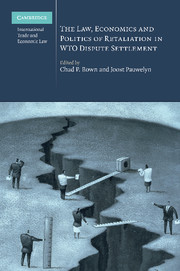Book contents
- Frontmatter
- Contents
- List of tables and figures
- Contributors
- Introduction: trade retaliation in WTO dispute settlement: a multi-disciplinary analysis
- PART I Background and goal(s) of WTO retaliation
- PART II A legal assessment after ten arbitration disputes
- PART III An economic assessment after ten arbitration disputes
- PART IV The domestic politics and procedures for implementing trade retaliation
- PART V Problems and options for reform
- 15 Evaluating the criticism that WTO retaliation rules undermine the utility of WTO dispute settlement for developing countries
- 16 Optimal sanctions in the WTO: the case for decoupling (and the uneasy case for the status quo)
- 17 Sanctions in the WTO: problems and solutions
- 18 WTO retaliatory measures: the case for multilateral regulation of the domestic decision-making process
- 19 The WTO Secretariat and the role of economics in panels and arbitrations
- 20 The equivalence standard under Article 22.4 of the DSU: a ‘tariffic’ misunderstanding?
- PART VI New frontiers and lessons from other fields
- Index
19 - The WTO Secretariat and the role of economics in panels and arbitrations
Published online by Cambridge University Press: 26 February 2010
- Frontmatter
- Contents
- List of tables and figures
- Contributors
- Introduction: trade retaliation in WTO dispute settlement: a multi-disciplinary analysis
- PART I Background and goal(s) of WTO retaliation
- PART II A legal assessment after ten arbitration disputes
- PART III An economic assessment after ten arbitration disputes
- PART IV The domestic politics and procedures for implementing trade retaliation
- PART V Problems and options for reform
- 15 Evaluating the criticism that WTO retaliation rules undermine the utility of WTO dispute settlement for developing countries
- 16 Optimal sanctions in the WTO: the case for decoupling (and the uneasy case for the status quo)
- 17 Sanctions in the WTO: problems and solutions
- 18 WTO retaliatory measures: the case for multilateral regulation of the domestic decision-making process
- 19 The WTO Secretariat and the role of economics in panels and arbitrations
- 20 The equivalence standard under Article 22.4 of the DSU: a ‘tariffic’ misunderstanding?
- PART VI New frontiers and lessons from other fields
- Index
Summary
Introduction
The process of resolving disputes under the WTO's Dispute Settlement Understanding (DSU) involves a complex and evolving legal jurisprudence. One foundational element to the WTO legal contract is that WTO adjudicators – that is, panellists and arbitrators – issue formal rulings that might result in changes to members' economic policies. This tight link between WTO dispute settlement and changes to members' economic policy makes it important to understand, evaluate, and continually refine how economic analysis is used to influence the legal–judicial process that is a critical element of the WTO's institutional performance.
Consider two representative examples of DSU panellists' and arbitrators' direct influence on members' economic policies. One is the US–Steel Safeguards dispute in which the prospect (or realization) of a DSU arbitration and authorized retaliation induced the respondent country to comply with WTO obligations by reforming a policy that adversely affected another member's expected market access benefits. In this dispute, the United States responded to the threat of DSU arbitration by eliminating a WTO-inconsistent safeguard and thus decreasing the US import tariff. A second example is the EC–Beef Hormones case; even though the dispute settlement process failed to change the respondent's economic policy and induce compliance, WTO arbitrators established a level of permissible retaliation that authorized the adversely affected complainant to change its economic policy. In this case, the complainant policy change was an increase in the US import tariff. And while these two disputes are examples of induced changes in national trade policies, almost every dispute involves a contested government measure affecting markets or economic incentives, and thus affects some element of a nation's economic policy.
- Type
- Chapter
- Information
- Publisher: Cambridge University PressPrint publication year: 2010
- 5
- Cited by



